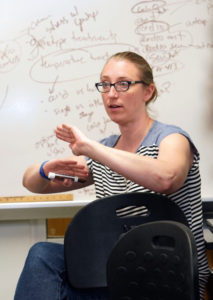To teach mitosis, April Wynn has students in her class act out the process, portraying chromosomes that divide into nuclei. The assistant professor of biological sciences hopes to replicate lively exercises like this – but virtually – in the fall.

“My goal is to promote the same level of engagement, energy and enthusiasm in an online space,” said Wynn, who, as faculty director of the University of Mary Washington’s First-Year Experience, is helping other instructors do the same for their classes.
Professors often spend their breaks on scholarly research, but Wynn is among dozens of UMW faculty members who went back to school this summer. Through a new faculty learning community called Compelling Courses, representatives from nearly every academic department have been teaching each other how to deliver dynamic online lessons and incorporate the best of the UMW experience into distance learning.
In March of this year, UMW professors – the majority of whom had never taught online – abruptly had to shift to a new method of teaching. The succeeding months have given these instructors time to tinker with and tweak tools so that they are fully prepared to teach virtually if necessary. Many, like Wynn, have found that this modality can even offer benefits.
“We believe teaching can be excellent regardless of medium,” said Professor of Economics Steve Greenlaw, who launched the group with Professor of Communication Anand Rao. “It all depends on how you design the course.”
The community was an offshoot of the ongoing ReFocus Online, a four-week course design camp that launched in June. UMW’s Center for Teaching paired with Digital Learning Support to create the university-wide professional development initiative, with assistance from the Office of Disability Resources and UMW Libraries. It comprises weekly workshops, Q&A sessions and a comprehensive website that houses resources and models that are being used by instructors at other schools throughout the Commonwealth.
“Approximately 200 individual faculty attended at least one ReFocus Online event this summer, and many more accessed our online materials,” said Center for Teaching Director Victoria Russell. “Faculty and staff openly shared teaching challenges and worked together to offer each other ideas. Our goal this fall is to keep these connections strong by offering spaces for continued conversations and support.”
With over a decade of combined online teaching experience, Greenlaw and Rao invited their colleagues to participate in the Compelling Courses community to build on what they learned in ReFocus Online. Meeting weekly on Zoom, the faculty began by brainstorming the unique characteristics of a UMW course – such as small discussion groups and hands-on learning opportunities – and identifying the classes they wanted to reimagine.
They’ve delved into topics like tech tools, flipped classrooms and virtual guest speakers; discussed academic integrity; and weighed the benefits of synchronous and asynchronous learning. Most importantly, they’ve discovered how to foster the collaboration and engagement that Mary Washington is known for – in an online format.
Building connections between students and faculty from the onset was critical to Wynn, who was inspired to help First-Year Seminar (FSEM) instructors create “blockbuster movie style trailers” to introduce freshmen to their classes and professors.
“The more humanized we can make this experience, the better,” said Wynn, adding that these creative videos also showcase professors’ passions and interests. Seeing faculty in this light will help first-year students begin to form the types of relationships that are the basis for a successful Mary Washington education, she said.
The group’s “we’re-all-in-this-together” approach appealed to Psychology Professor Mindy Erchull. Though she felt she had much to learn, she unexpectedly found herself demonstrating a Zoom screen-sharing feature to a colleague.
“That’s what this community is all about,” Erchull said. “Supporting each other so we can do the same for our students.”
After participating in the learning community, Alexandra Dunn plans to communicate with her students more frequently. “I need to explain not only what they’ll learn, but why they’ll be doing it,” said Dunn, an assistant professor of management in UMW’s College of Business.
Like many faculty, Dunn plans to use a flipped classroom model. Students will work through material on their own and then reconvene over Zoom and Canvas for in-depth discussions, to ask questions and get help if they’re struggling. But she recognizes she may need to pivot if something doesn’t work for her students.
“We’ll all likely face unexpected obstacles,” Erchull said. “Adaptability will be key, and that’s a great life skill for our students to develop.”
Compelling Courses helped Cate Brewer, a senior theatre lecturer, consider the ways acting in a virtual space can strengthen her students’ skill sets. During the spring, her classes collaborated on original pieces and wrote and performed monologues based on family members they observed during the quarantine. They discussed how to convey emotions when you can’t see a fellow actor’s face and how to make clear acting choices despite social distancing.
“We certainly missed elements of live theatre,” she said, “but the deep level of engagement and connection we have in our face-to-face classes translated well to the online environment.”
And with the tips and tools she picked up this summer, Brewer expects the fall will be even better.
“I want my students to know that I’ve been working diligently to create great courses for them,” she said. “This might not have been what they had in mind, but I promise we’ll still have so much to experience and learn together.”
Great words: ” “My goal is to promote the same level of engagement, energy and enthusiasm in an online space.” Very relevant today. Thanks for your work!